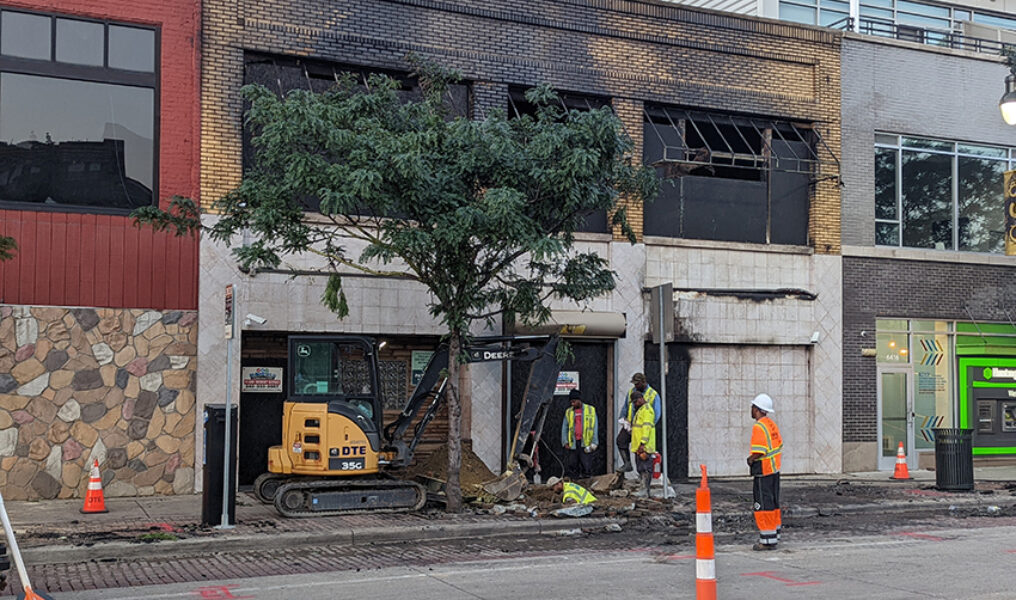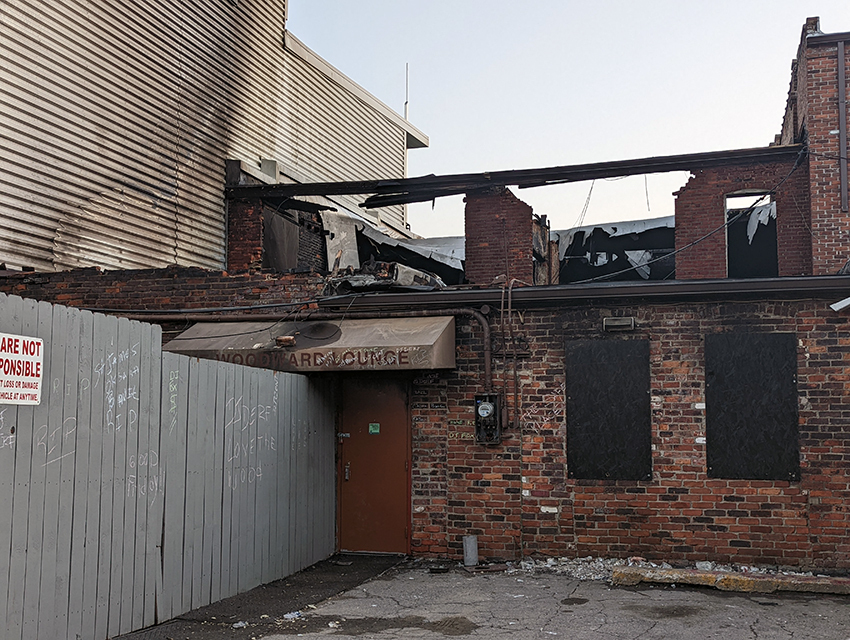A Welcoming Home to Detroit’s LGBTQ+ Community For Decades, Woodward Bar & Grill Destroyed by 3-Alarm Fire
‘Where we gonna go now?’ patrons wonder

It’s the end of an era. The Woodward Bar & Grill, Detroit’s oldest gay bar, caught fire yesterday morning around 10:30 a.m. and burned down in a 3-alarm fire. The structure still stands, but the roof caved in on itself and is gone. Authorities say the fire is a total loss.
Nearby residents, shoppers and workers were evacuated and QLine service was halted as firefighters worked to calm the blaze. The bar continued to smolder late into the afternoon.
By dusk, as crews worked to board up the building’s front exterior, a crowd had assembled in the Woodward’s rear parking lot. Some came simply to remember, others to pay homage and raise a glass — or a bottle — one last time at the legendary bar. A crowd of around 50 had gathered by 9 p.m.
Krissy Jackson said she had been coming to The Woodward for more than 15 years. “I came up here because this is my home, my place, my comfort zone, my happy spot,” she said. “It was a place I could come and be myself with no judgment. It was just love and fun.”
David Brown said he’d been coming to the bar since 1975. He said word of the fire traveled quickly not only throughout the city but the country as well. Friends were texting him from all over as they heard the news. “They sent me pics from Atlanta and California,” said Brown. “I just got in my car and decided to come down here. They said people were in the lot like the bar was open. I just came down to support.”

The Woodward Bar & Grill was opened at its present location, near the corner of Woodward Avenue and Milwaukee Street in Midtown, in 1954. It did brisk business in the daytime and at happy hour thanks to being so close to the General Motors World Headquarters, then located on West Grand Blvd.
William Karagas was the original owner, and Sam and Andy, his two brothers, helped him out. Night by night, the Woodward gradually began attracting a gay clientele. And by the end of the decade, it had become a full-time gay bar.
“We just opened it up and whichever way it went, it went,” Andy Karagas said in a 1973 interview with "Gayzette." “And when it went gay all the way, we kicked out all the straights that night.”
Andy Karagas soon came out as gay himself and was a regular host at the bar. He was known for, among other things, repeatedly calling out the phrase “Tonight’s the night,” his voicing ringing out loudly across the tiny bar.
In the ‘60s and even the ‘70s, The Woodward, like other gay bars that had begun popping up around the city, was basically segregated and served a predominantly white crowd. Black patrons would be required to present two forms of ID to enter. And if they did get in, the humiliation would often continue.
“Blacks, if served at all, had their drinking glasses broken audibly as they were leaving the bar,” said longtime “Between The Lines” columnist Charles Alexander, who first started going to The Woodward in 1959 at age 23.
“That’s where I first met (legendary Michigan LGBTQ+ activists) Jim Toy and John Kavanagh,” Alexander recalled. “They were holding up copies of the ‘Gay Liberator’ newspaper.”
The Woodward continued to chug along throughout the ‘80s as other gay bars came — and just as many went. Andy Karagas enjoyed enormous popularity in Detroit’s LGBTQ+ community. He was a member of the Detroit Bar Guild and was known for having a good heart. Oftentimes, he’d go so far as to bail out a customer who’d gotten picked up by the cops on trumped up soliciting charges.
Lorraine Karagas, Andy’s brother’s wife, took over at the bar when Andy died in 1997. She remains a co-owner to this day.
By now, the bar was serving a very mixed crowd and was on its way to becoming the most popular night spot in Detroit for the city’s African American LGBTQ community. Jeff Smith, a longtime employee of the bar, would come on as co-owner in the early 2000s and take over the running of the bar. Under his leadership, the bar went on to see renovations, and the comfy booths on the dance floor side were replaced by high top tables to make more room for the growing crowds.
Black promoters started working with Smith. Hotter Than July, known initially as Detroit Black Gay Pride, began holding events there. There were live drag shows and a Miss Woodward pageant was added to the mix. Hot male dancers were brought in for special occasions.
Over the years, The Woodward hosted countless birthday parties, too many memorial celebrations, karaoke nights, fundraisers and just about every type of event you can imagine. A man was shot and killed last year outside the bar’s back entrance and attendance dipped for a bit. However, as the seasons changed and the weather started heating up, the crowds were coming back.
The Woodward’s legacy
For over 60 years, The Woodward has stood witness to the changing times and the progress the LGBTQ+ community has made toward equality. Even as the crowds changed from white to Black and the neighborhood went from being called New Center to Midtown, the bar stood the test of time and became something of an LGBTQ+ institution.
“This is where gatherings occurred for LGBTQ+ and allied people, neighbors and the working class within the heart of Detroit’s main street for decades,” said Curtis Lipscomb, executive director of LGBT Detroit and leader of Hotter Than July. “The Woodward is a staple in the community, and its destruction is a devastating blow to the social fabric.”
Cierra Dior Malone was Miss Woodward 2015. She performed at the bar weekly as part of The Diva Show right up until last week. “I feel like I just lost my best friend,” she said. “So many relationships that I made at the bar that I don’t know if I would have had if it wasn’t for The Woodward.”
Tim Retzloff is an LGBTQ+ historian and assistant professor in the Center for Gender in Global Context at Michigan State University. When asked to speak to the bar’s significance to the community he said, “Its 68-year-legacy as a meeting place for the LGBTQ+ community in Metro Detroit shaped the lives of tens of thousands of queer folk in southeast Michigan. Its loss as an institution that provided safe space for generations before and after Stonewall is beyond measure.”
Pride Source was unable to reach Smith for comment, but he told WWJ News Radio that he was feeling “a lot of mixed emotions right now. I’m sad. I’m just trying to determine at this point what my next step will be.”
The crowd gathered outside the charred remains of The Woodward Tuesday night were pondering the same thought.
“My question is, ‘Where we gonna go now?’” said Jackson. “That been coming out of people’s mouths all day.”
“‘Where we gonna go now?’”










